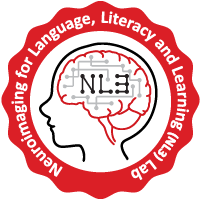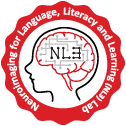SLPA 855 Neural Basis of Reading (2-3 CREDITS)
EVERY WEDNESDAY 3:00-6:40 P.M. EAST CAMPUS BARKLEY CENTER 302
This course is a graduate-level course and is designed to address reading development, reading assessments, and the neural basis of reading. Through in-class discussions and case studies, students will learn how to think critically when reading research articles and how to evaluate the appropriateness of assessment/treatment plans in evaluating or treating children with reading difficulties. In addition, students will learn evidence-based practice in reading intervention and learn how to collect qualitative and quantitative data to monitor progress. This course complies with the ASHA Knowledge and Skills statement regarding the provision of services to individuals with language/literacy impairment. Upon successful completion of this course, it is anticipated that students will be able to understand core concepts, research, and clinical issues central to language/literacy acquisition.
At the end of the course, it is anticipated that students will be able to understand core concepts, research and clinical issues related to SLP.
- Learn basic concepts, terminology, and theory in reading acquisition.
- Understand behavioral assessments that can be used to evaluate a child’s pre-reading or reading skills.
- Apply assessment and/or treatment questions to case examples.
- Evaluate the appropriateness of assessment and/or treatment plans.
- Understand the use of qualitative and quantitative data in monitoring treatment progress.
- Master interprofessional interactions through role-playing.
SLPA 856 Neuroimaging & Language Disorders(2-3 CREDITS)
EVERY MONDAY 5:00-6:40 P.M. in B60 suite of CB3 (City Campus)
This course is a graduate-level seminar course and is designed to train students from diverse backgrounds to understand the characteristics of various types of brain imaging techniques and their applications in the field of communication disorders. This seminar course aims to introduce six neuroimaging techniques, including functional Magnetic Resonance Imaging (fMRI), MRI, functional Near-InfraRed spectroscopy (fNIRS), Magnetoencephalography (MEG), Electroencephalogram (EEG), and Diffusion-Weighted Imaging (DWI). Students will have hands-on experience with some brain imaging data and learn how to analyze different types of brain imaging data. Through interactive discussion and literature review, students will practice how to generate neuroscience questions in their research fields of interest and apply appropriate brain imaging techniques to answer their research questions. The overall goal is to broaden graduate students’ interests in brain research and encourage them to apply brain imaging techniques to research in their fields of interest.
At the end of the course, it is anticipated that students will be able to understand core concepts, research and clinical issues related to SLP.
- Understand the characteristics of different brain techniques.
- Provide hands-on experience with analyzing various brain imaging data.
- Demonstrate critical thinking through evaluating current literature on neuroscience research related to reading impairments.
- Formulate hypotheses of a research topic by choice and develop research strategies to test hypotheses.
- Master research design and methods in the context of brain imaging research.
SLPA 862 Cognition and Language in Adults (3 CREDITS)
EVERY MWF 1:00-1:50 P.M. in BKC – Room # 321
Typical and impaired cognition and language in adults. Assessment and evidence-based management. Typical aging, aphasia, traumatic brain injury, dementia, right hemisphere disorders, and developmental disabilities.
The objectives for this course are derived from the ASHA certification and CAA standards in this area of study.
SLPA 981 NEUROIMAGING & LANGUAGE DISORDERS (2-3 CREDITS)
EVERY WEDNESDAY 3-4:40 P.M. EAST CAMPUS BARKLEY CENTER 302
This is a research seminar course and is designed to explore special topics in neuroscience, clinical therapeutics, and brain-behavior. Based on the interests of enrolled students, past and current research projects of interests will be discussed in the class. The goal of this course is to broaden graduate students’ interest in brain research and connect brain research with the current clinical practice in the field of speech-language pathology (SLP) and audiology.
At the end of the course, it is anticipated that students will be able to understand core concepts, research and clinical issues related to SLP.
- Learn different types of brain imaging tools and how they can be used in research.
- Learn the connection between basic research and clinical practice.
- Compare and summarize research findings from different articles and resources.
- Interpret research data and statistical analyses from results section of published articles.
- Demonstrate critical thinking about research questions and findings in the literature.
SLPA 896 LANGUAGE & LITERACY (2 CREDITS)
EVERY WEDNESDAY 5-6:40 P.M. EAST CAMPUS BARKLEY CENTER 302
This course is designed to address the cognitive processes associated with language and literacy acquisition. Past and current research in language and literacy will be discussed with a connection to neuroimaging methods (EEG, MEG, fMRI, fNIRS, etc.). Various topics include analysis of scientifically based research on language and literacy, brain development during language and literacy acquisition, and reading intervention.
At the end of the course, it is anticipated that students will be able to understand core concepts, research and clinical issues central to language and literacy acquisition.
- Learn basic concepts, terminology, and theory in the area of language and reading.
- Understand language and reading related behavioral tests.
- Compare and summarize research findings from different articles and resources.
- Interpret research data and statistical analyses from results section of published articles.
- Demonstrate critical thinking about research questions and findings in the literature.
2016 Fall Syllabus | 2017 Fall Syllabus | 2018 Fall Syllabus
Guest Lecture
SLPA 453: Neurological Foundations of Speech and Language (2-3 CREDITS)
EVERY Monday and Wednesday 2:00-3:15 P.M., in Food Industry Complex (FOOD) 42 (3720 East Campus Loop S) (East Campus)
This course is a required course for undergraduate students in Communication Sciences and Disorders (CSD) program. The student population mainly consists of seniors in CSD and some graduate students in Speech-Language Pathology (SLP) or Biological Systems Engineering (BSE). This course is designed to teach students about the organizations (neuroanatomy) and functions (neurophysiology) of the human nervous system involved in speech and language. The course covers the foundational knowledge of neuroanatomy and neurophysiology of the central and peripheral nervous systems, the neurology of the human communication processes, and the classification of impairments based on the lesion sites.
Courses Offered on Demand
BSEN 896 SEC 601 Independent Study With a focus on Neuroimaging
This is an independent study with special focus on neuroimaging techniques and is designed to give students solid understanding of state of art neuroimaging techniques including Electroencephalography (EEG), Magnetoencephalography (MEG), and Functional magnetic resonance imaging (fMRI), Diffusion Tensor Imaging (DTI). Students are expected to work on sample data on their own and bring questions to bi-weekly or weekly meetings. In addition, special topics can be discussed based on the interests of enrolled students. This course is usually offered based on the demand. Most of time, it is offered in the summer semester. But it can be offered in the spring semester too. If you are interested, you can send email to yingying.wang@unl.edu.
Summer Workshops
2017 UNL Summer Workshop
This is a summer workshop offered at Center for Brain, Biology, and Behavior (CB3) in 2017. A group of faculty members from CB3 got together and organized this training. The aim of the workshop is to provide hands-on experience for undergraduate or graduate students who are interested in functional magnetic resonance (fMRI) data analysis. The assigned reading is Scott Huettel’s fMRI book. Each day, the group meets 10am-12noon in the computer lab, and then the students will have required homework to complete before the next meeting. The students are encouraged to work together on the data analysis assignments, but the reading assignments should be done independently. When reading is assigned, the student will be required to write 2 questions based on the reading to submit to the instructors by midnight before the next meeting. The tentative schedule is:
Day1 (June 12): Intro – set up workstations, download data (HW: read about preprocessing and write 2 questions)
Day2 (June 13): Go through preprocessing in FSL and answer conceptual questions (HW: practice on another dataset and on own data, if you have it)
Day3 (June 14): Preprocessing, continued – talk about QC issues
Day4 (June 15): Catch-up, ask questions (may not need a meeting if students prefer to use this time for practice)
Day5 (June 20): First level analysis (HW: practice on another dataset and on own data, if you have it)
Day6 (June 21): First level analysis, continued; Adding behavioral regressors
Day7 (June 22): Second level analysis
Day8 (June 23): Discuss HW/questions and do wrap-up
Currently, this workshop is not offered every summer. But if there are enough students who are interested in this workshop, it can be offered again. If you are interested, please Email Dr. Wang at yingying.wang@unl.edu or Call her at 402-472-0106.
2014-2015 Summer Neuroimaging Training
During Dr. Wang’s postdoctoral training period at Boston Children’s Hospital/Harvard Medical School, She organized two workshops for summer of 2014 and 2015. All the materials are publicly available. You can click the following links to visit the actual training websites:
2013 Neuroimaging Summer Workshop
When Wang was a graduate student at Cincinnati Children’s Hospital/University of Cincinnati, she organized this summer neuroimaging training course to teach summer interns how to analyze fMRI data. Wang prepared two lectures on advanced imaging methods including independent component analysis and connectivity analysis. She also held two hands-on lab sessions and helped trainees with various analysis questions. The original website for downloading the training materials is offline now. If you are interested in more details, please Email Dr. Wang at yingying.wang@unl.edu or Call her at 402-472-0106.
Questions
What shall you do if you do not know which class is more suitable for you?
Do not hesitate to Email Dr. Wang at yingying.wang@unl.edu or Call her at 402-472-0106.
Communities and Public Speaking
Dr. Wang and her research team are excited to share their research with communities through talks and symposium targeted to teachers, parents, and children, as well as hands-on activities for preschoolers and school-age children to learn about the brain. We aim to share our research discoveries to the general public. If you are interested in knowing more about us or ask Dr. Wang to speak at your event, please email us at yingying.wang@unl.edu.
Dr. Wang Gave Talk at Department of Statistics
Title: The Reading Brain – White matter development in children at risk for dyslexia
Abstract: Developmental dyslexia is a neurodevelopmental disorder with a strong genetic basis. Previous studies observed white matter alterations in the left posterior brain regions in adults and school age children with dyslexia. However, no study yet has examined the development of tract specific white matter pathways from the pre-reading to the fluent reading stage in children at familial risk for dyslexia (FHD+) versus controls (FHD-). This study examined white matter integrity at pre-reading, beginning, and fluent reading stages cross-sectionally (n=78) and longitudinally (n=45) using an automated fiber-tract quantification method. Our findings depicted white matter alterations and atypical lateralization of the arcuate fasciculus at the prereading stage in FHD+ versus FHD- children. Moreover, we demonstrated faster white matter development in subsequent good versus poor readers and a positive association between white matter maturation and reading development using a longitudinal design. Additionally, the combination of white matter maturation, familial risk and psychometric measures best predicted later reading abilities. Furthermore, within FHD+ children, subsequent good readers exhibited faster white matter development in the right superior longitudinal fasciculus compared to subsequent poor readers, suggesting a compensatory mechanism. Overall, our findings highlight the importance of white matter pathway maturation in the development of typical and atypical reading skills.

